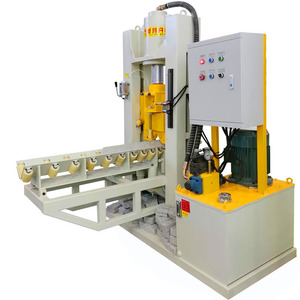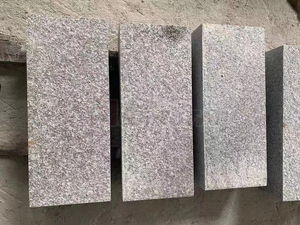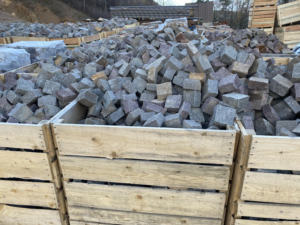(4743 products available)
















































































































































































































A stone cube block is a solid piece of stone that can be used for construction or decorative purposes. They are made from different materials, which makes them suitable for various applications. Here are the types of stone cube blocks:
Granite
A granite block stone cube is a durable and attractive option. It is resistant to scratches and heat. This makes it ideal for high-traffic areas. Additionally, it comes in different colors and finishes that can match any aesthetic. It is used in the building of foundations, walls, and monuments. Due to its strength, it can be used as a decorative element in landscaping.
Limestone
The limestone block stone cube is easy to cut and shape. This makes it a popular choice for architectural applications. It has a subtle beauty and can be used for a wide range of structures. These include homes, churches, and civic buildings. It can also be used as landscaping walls and walkways.
Marble
Marble stone cubes are known for their elegance and sophistication. They add a touch of luxury to any space. These cubes are popular in bathrooms and kitchens because of their smooth and cool-to-the-touch surface. They are also used in the building of monuments and statues. This is due to their exquisite veining and glossy finish.
Sandstone
Sandstone blocks are made from natural materials. This makes them easy to blend with the surrounding. They are also versatile and durable. The sandstone blocks are used to make walls, walkways, and patios.
Bluestone
These are dense and durable volcanic stones. The bluestone stone block is loved for its rich blue-gray color. It is used in outdoor applications like patios, driveways, and pool surrounds. The bluestone is slip-resistant, making it a safe option for wet areas.
Basalt
Basalt stone blocks are formed from solidified volcanic lava. They have a dark gray or black color with a rough texture. The cubes are durable and require little maintenance. They are used for driveways, walkways, and other high-traffic areas.
Fieldstone
The fieldstone blocks are sourced from the fields. They have a natural and rustic look. The stones are used to make walls and fireplaces. Farmers used to clear these stones from their fields, making them a cost-effective option.
Durability:
Stone blocks are durable and long-lasting. They can withstand harsh weather conditions without breaking or fading. Stone cube blocks maintain their beauty and structural integrity for many years.
Low maintenance:
Stone blocks do not require a lot of maintenance. They are easy to clean and do not need painting or sealing. This makes stone blocks a cost-effective choice for homeowners.
Versatility:
Stone blocks are very versatile. They can be used to build walls, foundations, patios, walkways, and driveways. This makes them an ideal choice for different construction projects.
Aesthetic appeal:
Stone blocks have a natural look that can improve the beauty of any home. They come in different colors and shapes, which makes it easy to find the right stone block that will complement the style of your home.
Insulation:
Stone cube blocks provide insulation. They help regulate temperatures inside the house, which reduces the need for heating and cooling. This can help homeowners save on energy costs.
Support and load-bearing capacity:
Stone blocks can support a lot of weight. They are excellent for load-bearing walls and structures. This ensures that the home or building is safe and stable.
Resistant to pests and fire:
Stone blocks are pest and fire-resistant. This provides an extra layer of protection for your home. Stone blocks also provide excellent protection against pests like termites and rodents.
Climate friendly:
Stone blocks are good for the environment. They are made from natural materials that can be recycled. This makes them a good choice for homeowners who want to protect the environment.
Enhanced property value:
Using stone blocks to build or landscape increases the value of your property. Homebuyers like stone blocks because they are durable and need little maintenance.
Stone cube blocks have a wide range of applications due to their durability and aesthetic appeal. Some of the common applications include:
When buying granite cubes for sale, it is important to consider a few things to ensure the blocks are suitable for the intended use. This includes:
Consider the Size and Shape
The granite blocks' size and shape will affect how they are used and how much they cost. Large blocks are good for building walls and foundations, while smaller blocks are better for paving and landscaping. Get blocks with the right size and shape for the project to avoid wasting money or having unsuitable blocks.
Consider the Color and Texture
Granite comes in different colors and textures, from smooth to very rough. Choose a color and texture that will look good for the project, whether it is for landscaping or building something. The color and texture are just as important as how strong the granite is.
Consider the Quality
When looking at different granite blocks, inspect them carefully. Look for any cracks, rough spots, or other problems that could affect how well the blocks work. It is important to take a few minutes to check everything before agreeing on the blocks to make sure they are all in good shape and will meet your needs. This little extra effort now can help prevent issues later on.
Consider the Cost
The cost of the stone block will vary depending on the size, shape, and quality. It is important to keep in mind that larger blocks or those with fewer flaws will cost more, but they may also save time and money later on because there will be fewer issues while working on the project.
Consider the Supplier's Reputation
Before getting a a stone block, check out the supplier's reviews and see what other people have said about them. A good supplier will have satisfied customers who will be willing to share their experiences. Take some time to do this research so that the choice of supplier will be a safe one.
Q1: What are the sizes of the decorative stone cube blocks?
A1: The sizes differ depending on the intended use. For example, a decorative stone block can measure 10x10x10 cm, 15x15x15 cm, and 20x20x20 cm, among other sizes.
Q2: Are the cut stone blocks ready to use out of the box?
A2: Yes, the cube block is ready to use. However, users have to seal it to prevent staining and damage. They also have to ensure it remains intact by maintaining and cleaning it properly.
Q3: How much do the stone cubes blocks weigh?
A3: The weight varies depending on the size and type of stone. For example, a stone block that measures 10x10x10 cm weighs about 100 kg per cubic meter. A bigger block, such as 15x15x15 cm, weighs about 225 kg per cubic meter. The only way to know the exact weight of a cubic meter is to measure the size.
Q: How does the size of the block affect its stability?
A4: The stability of the block only affects when stacking it. For example, a small block will be more stable when stacked compared to a large one. This is because it has a smaller surface area, which reduces the toppling risk.
Q: How are the stone cube sizes and shape measured?
A5: Accurate size and shape are measured using a caliper, measuring tape, and micrometer. The small size tools measure the outer size of the small-sized stone blocks, while the large ones measure the large blocks.